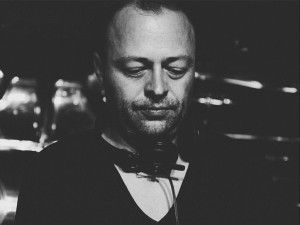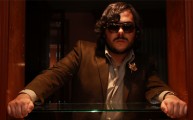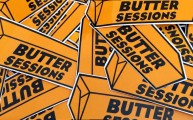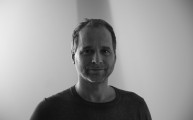Exclusive interview with Rainer Trüby (Compost Records)

Rainer Trüby travels the world to play his eclectic DJ sets since more than 20 years. Born in the Stuttgart region, he soon became one of the first members of the Compost family and especially his freestyle project Trüby Trio together with Christian Prommer and Roland Appel made massive waves in the nu jazz scene in the early ’00s. Trüby is definitively an epicure in every aspect, he enjoys cooking, selects his next track as conscious as a sommelier knows the right mix of oak and grabes. EDHID spoke to him about collecting records, defining an own DJ style, the Trüby Trio and why to fish in slower BPM territories. Enjoy!
Hi Rainer! Can you describe your first contact with music?
In the Stuttgart region we had some U.S. barracks and my dad had some soldier friends who gave him swing records from artists like Louis Armstrong and many more. He was not a musician but he was definitively a jazzman and his record collection influenced me to a certain extent. However, the real musical evolution started for me with ‘80s blue-eyed soul pop like Level 42, Scritti Politti, ABC, Frankie Goes to Hollywood or Bryan Ferry.
“The real musical evolution started for me with ‘80s blue-eyed soul pop like Level 42, Scritti Politti, ABC, Frankie Goes to Hollywood or Bryan Ferry.”
When did you have your first clubbing experience?
At the age of 16 or 17, there was a G.I. club in downtown Stuttgart called “Maddox” where soldiers played for soldiers. Although it was not allowed, they let me in and I had there the chance to listen for the first time to music from artists like Cameo, Earth, Wind & Fire, Kool & the Gang or as Swabians would simply generalise it as “black music” (laughter). These times were clearly an initial spark for my musical interest.
“I had no DJ experience at that time but I had a broad and exceptional collection of records”
How it came that you swapped the dance floor with the DJ booth?
Influenced by these club nights, I discovered my interest in hip-hop and started reading Spex and other style-defining magazines. I listened heavily to music from A Tribe Called Quest, De La Soul and Jungle Brothers among others. During a visit in London, I went to Greenwich Market and got caught at a stand of some rare groove freaks with boxes of vinyl that have big Afros on the cover and one turntable to listen. Among the various gems, I listened to The Blackbyrds’ “Blackbyrds’ Theme” and recognised that one of my favourite Jungle Brothers songs makes use of this sample. On that occasion actually, I realised how hip-hop works with all the sampling. Back in Stuttgart, I started digging more and exchanged some vinyl with Michael Beck alias DJ Hausmarke of the German hip-hop band “Fantastische Vier”. He had a night at Alexander (Ali) & Sebastian (Basti) Schwarz’s (editor’s note: Tiefschwarz) new club called “ON-U” which was actually the same location as “Maddox”. The way Hausmarke blended smoothly original versions with new hip-hop stuff that sampled the original just boosted my passion and after a while I overpassed him with my record collection. When Ali & Basti heard about my vinyl treasure, they offered me to play my favourite songs at “ON-U” on Sundays. I had no DJ experience at that time but I had a broad and exceptional collection of records (laughter).
Speaking about your connection to “Fantastische Vier”, your record collection also served as a source of inspiration for some tracks of them, right?
Yes, the samples for “Die Da” and “Tag am Meer” derive from my record collection. “Die Da” is actually based on a sample from Asha Puthli’s “Right Down Here”.
After more than 20 years behind the decks. What would you recommend to aspiring DJs?
Well, I would say defining his own style changed due to the Internet. During my time, it was all about having records that no one else does. I remember that I drove explicitly to Stuttgart’s central station to buy there a new edition of the Blues & Soul magazine in which Kevin Beadle wrote a column and charted some rare groove, soul, funk, jazz songs. This was like a first indication point in which direction I can dig in the record store. There was no “Whatpeopleplay” or Beatport charts, as we have today, that every DJ aspirant can access worldwide. Now people can track their favourite DJs easily and buy the music they play via different platforms.
Does this mean that you miss the old days when someone had to cut his own way through liner notes?
It depends on many things actually. Look at Gilles (editor’s note: Gilles Peterson) he has such a strong stage presence. He manages to combine old and new, hip-hop and house, jazz and break beats in such an authentic way that his entourage includes also young people who discover old gems due to him. He is definitively a strong tastemaker. In general, collecting music influences your approach to music since it enables you to comprehend connections and trends within and between genres. I was always a record digger. I even brought my sought-after findings to the UK and traded them with Gilles Peterson, Patrick Forge, Kevin Beadle or James Lavelle from the Mo’Wax label.
How would you describe your style of DJing?
Two types of DJ sets evolved over time. One is a rather tight, pure, prime time house set and the other is a more vinyl-phile three or four hours set at which I bend an arc of suspense from soul, funk, jazz, latin to house. I definitively prefer longer slots since it is difficult to convey all your musical diversity in 90 minutes without suffering of the groove.
When did you discover house for yourself?
House was actually completely not on my radar in the beginning of my DJ career. In 1997, only then I started to include a tiny bit of jazz or latin-influenced house in my sets. Since 2000, however, I would say that I play a lot more of house during my shows. I even started to collect old records from legendary New York house labels like Strictly Rhythm, Nervous or Nu Groove that I did not consider in the beginning of the ‘90s (laughter).
How did the connection to Compost Records emerge?
I meet Michael Reinboth in 1993. Our releases with A Forest Mighty Black and my “Glücklich” compilations are among the first catalogue numbers of Compost Records so my friendship evolved over more than 20 years.
You do also A&R work for Compost Records, right?
Well, I tour a lot as a DJ. Every time when I receive interesting productions, I try to interconnect. It worked out well so far (laughter).
How did the idea for the Trüby Trio come up?
I met Christian Prommer and Roland Appel during a Compost Records label tour. We are all passionate vinyl collectors so we were immediately on the same page and started exchanging records among each other. Apart from the Trüby Trio, Christian and Roland worked already together on several other projects like Papillion Productions, Fauna Flash or Voom:Voom with Peter Kruder. After a short while, we decided to start a freestyle project under the moniker Rainer Trüby Trio. Since the name indicated a strong focus on my person, we thought about to re-name the project afterwards but we had already some releases out so we just changed it to Trüby Trio.
Together with Jazzanova, the Trüby Trio was among the driving force behind Germany’s nu jazz movement. When did you decide to continue on your individual careers?
We just let our diverse backgrounds like jazz, latin, boogie or drum & bass to have an influence on our production style. Besides our own productions, our remixes for Frederic Galliano, Bebel Gilberto, Thievery Corporation, Peace Orchestra, Tab Two and many more aroused some international interest that resulted in compiling the renowned DJ-Kicks series in 2001. In 2003, we released our debut album “Elevator Music” and our compilation “Retreated” one year later indicated already an increased influence of electronic music on us. Although we have not released productions since 2005, we neither dissolved the project officially so we may start again in future.
What influenced you to continue with house productions?
I teamed up with Danilo Plessow alias Motor City Drum Ensemble and we released our first productions “To Know You” and “Ayers Rock” in 2009. After Danilo moved to the Netherlands, I joined forces with Marlow for some productions on Compost Records or remixes as Tosca’s “Stuttgart” and recently a refix for Joey Negro’s The Sunburst Band.
“You can create so much energy in slower territories under 120BPM”
You released various compilations as “Glücklich”, ”Maiden Voyage”, “Talkin’ Jazz 3”, “Root Down 99” and many more. Is there a new compilation upcoming?
Yes, I put together a house compilation called “Slouse” which will be released on 05 September through Compost Records. I somehow slowed down musically (laughter). Joking aside, you can create so much energy in slower territories under 120BPM. I mean productions of Detroit Swindle, Wolf+Lamb, Soul Clap for instance all get along with under 120BPM and still work perfectly at the dance floor. If I listen to some older productions with 127BPM for instance, it’s hard to imagine that these tracks have a groove anyhow (laughter).
Since 1996, You are runnning your own monthly party “Root Down”. Was it difficult to establish your own night?
My international bookings increased with my musical output. One of my first gigs abroad was 1994 at Phoenix Festival in UK. I remember that Jazzmatazz performed live and Gilles Peterson and I followed with a back-to-back DJ set. Two years later, I toured Japan for the first time. All these international bookings gave me the confidence to establish my very own night “Root Down” in Freiburg. I played the first date alone and our success skyrocketed in a very short time.
What is the musical concept of the night?
Well, in the beginning we had also live bands, however, having a real live band requires a lot of planning activity. We had some live performances of electronic music artists though like Kyoto Jazz Massive, Paskal & Urban Absolutes and many more. Apart from that it’s mainly about DJ performances. Over the 18 years so far, we welcomed international artists and friends like Laurent Garnier, Theo Parrish, Jazzanova, Gilles Peterson, 4Hero, Phil Asher, Peter Kruder, Richard Dorfmeister, Axel Boman, Jimpster, Âme, Dixon, Solomun who played “Root Down” several times.
What’s next?
Well, “Slouse” is in the pipeline with release on 05 September. I will do a remix for my production partner Marlow’s new album that will be released on Sonar Kollektiv. We are also working on a remix for S.O.H.O.’s classic “Hot Music”. Finally, there will be a new “Glücklich” compilation soon.
Rainer Trüby’s new compilation “Slouse” will be released at Compost Records on 05 September 2014.
Slouse teaser
Rainer Trüby on Soundcloud
Trüby Trio feat. Marcus Begg “Universal Love” (Âme Rootdown Round Midnight Remix)
One response to “Exclusive interview with Rainer Trüby (Compost Records)”
Leave a Reply
-

EDHID SHORTCUT: Doruk Güralp (TUR)
-

‘La pachanga se conversa asi’ with Rebolledo
-

Tracking Imprints: AIM
-

Chloé at Suma Beach
-

Tracking Imprints: Butter Sessions
-

Season final at MiniMuzikhol
-

EDHID SHORTCUT: Philipp Grosser (DE)
-

Firing out an interview with Tiefschwarz
-

Walk talk with El_Txef_A
-

Lo-Fi talk with Dollkraut




[…] Edhid: Interview with Rainer Trüby The Skinny: Interview with Rainer Trüby […]